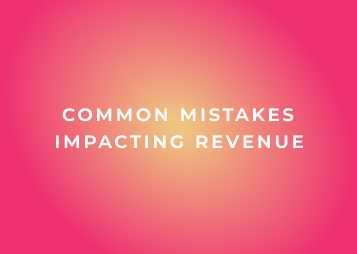By Tom Lavery
Revenue intelligence analyzes sales pipeline data from multiple sources to help teams understand deal progression and maximize revenue through smarter sales strategies.
Sales managers need to understand not just what's happening in their pipeline, but why deals move forward or stall. Revenue intelligence gives you that 'why' by serving as your single source of truth to analyze and improve sales performance.
With key metrics and actionable insights at your disposal, you can empower your organization with comprehensive, data- driven transparency. Revenue intelligence pulls from multiple data sources, including sales calls, customer support interactions, CRM records, and historical metrics like conversion rates and deal velocity.
This guide will walk you through everything you need to know about revenue intelligence, from examples of revenue intelligence in action to implementing the right platform and measuring success. You'll discover how leading sales teams use revenue intelligence to stop guessing and start winning more deals.
Why revenue intelligence for sales teams matters in a data-heavy world
Revenue intelligence helps sales teams close more deals by identifying which conversations drive wins, spotting at-risk opportunities early, and coaching reps on proven strategies.
Today's buyers do extensive research before talking to you, and they expect your sales teams to demonstrate knowledge of their challenges and previous touchpoints with your company. One of the many benefits of revenue intelligence is that it aggregates all customer and sales data to help you deliver these personalized experiences and increase your win rates.
Streamlined objectivity
Automated deal analysis eliminates human bias and delivers objective insights from actual conversation data.
Traditional sales intelligence shows you what happened and who was involved, but you're still stuck manually analyzing massive datasets to understand why deals succeed or fail. Revenue intelligence automates data analysis, removing human bias to give you objective insights based on conversation patterns and deal outcomes.
More detailed deal metrics
Granular deal metrics show exactly which conversation elements and behaviors lead to wins.
Revenue intelligence gives you the deep deal insights that matter: which questions your top performers ask, what objections they handle most effectively, how long successful discovery calls typically run, and which competitive positioning actually moves prospects forward. You can see patterns across won deals to identify the specific talk tracks, timing, and tactics that consistently convert prospects into customers.
Enhanced remote visibility
Remote sales teams need revenue intelligence to maintain deal visibility when they can't observe conversations and coaching moments in person.
Sales managers often struggle to understand what's happening in their pipeline without the ability to overhear calls or jump into meetings spontaneously. This is where understanding how revenue intelligence works becomes crucial—it automatically captures and analyzes every customer interaction, giving you the same level of insight into deal progression and rep performance that you'd have in an office environment.
How does revenue intelligence work, and what makes it intelligent?
Revenue intelligence automatically collects, analyzes, and centralizes customer interactions data to generate actionable insights that guide sales strategy and improve performance.
Unlike traditional reporting, revenue intelligence tools combine artificial intelligence and machine learning to eliminate human bias and uncover hidden patterns within CRM entries, emails, call transcripts, and other customer engagement records. This intelligence helps sales managers, sales reps, and revenue leaders alike understand what’s really driving deals forward—or holding them back—across the entire customer lifecycle.
Understanding this revenue intelligence definition is just the starting point. The real value comes from applying it strategically across your sales process. Revenue intelligence typically works through three core areas that transform raw data into winning strategies:
1. Customer intelligence
Customer intelligence analyzes conversation data to reveal what prospects actually care about, helping you tailor messaging that resonates.
Every prospect conversation contains valuable buying signals: budget timelines, implementation concerns, feature questions, and key stakeholder priorities. You can see which questions indicate genuine interest versus polite engagement, and spot the moments when deals shift from exploration to serious consideration.
This insight helps you focus conversations on the right topics for each prospect, creating more relevant interactions that build trust and accelerate the sales process.
2. Conversation analytics
Conversation analytics categorizes and analyzes sales conversations to identify patterns that predict deal outcomes and reveal coaching opportunities.
Knowing what makes a strong conversation versus a challenging one helps you prioritize deals with the highest conversion potential. In a typical hour-long call, over 6,000 words are spoken, but you'll only remember a fraction of the details that could influence the deal.
Conversation intelligence automatically transcribes and categorizes every interaction, creating searchable records you can analyze for insights. You can group calls by competitor mentions, track moments when prospects express excitement, or identify common objection patterns. This helps reps understand what messaging resonates and where deals typically stall.
3. Team and deal insights
Team and deal insights give managers visibility into rep performance and pipeline health, allowing them to identify coaching opportunities and at-risk deals.
Team Insights is a reporting suite for your teams, covering conversational activity, engagement statistics, themes, and coaching areas. It highlights areas of strength within your organization and provides a useful framework for identifying areas for improvement.
Deal Insights is a pipeline forecast showing which deals have which activity associated with them and identifying any risks associated with a deal. Deal insights are a useful barometer for any sales team to identify the interactions that help progress deals and turn prospects into customers.

What is a revenue intelligence platform?
A revenue intelligence platform is a dedicated software solution that captures and analyzes sales data and deal metrics to deliver real-time insights across the entire revenue cycle.
Leading revenue intelligence solutions integrate with CRMs, communication tools, and analytics systems to unify data from calls, emails, meetings, and other customer touchpoints. Rather than just showing what’s happening in your pipeline, they reveal the underlying patterns that explain why deals progress or stall.
This enables more accurate sales forecasting, faster decision making, better sales coaching, and optimized resource allocation for long-term revenue growth.
What are the benefits of using revenue intelligence in sales?
Revenue intelligence delivers a unified view of customer interactions and sales activities, empowering teams to identify high-value accounts, prioritise leads more effectively, personalize communications, and increase sales efficiency.
What is revenue intelligence helping you achieve? It enables you to:
Capture every interaction for complete visibility
Record, transcribe, and save all conversations. Understand where your sales efforts are focused and where improvement is needed instantly.
Use detailed analytics to uncover the "why" and "how"
See trends across hundreds of conversations through customizable dashboards and automated reporting. You get insights into what messaging works, which questions lead to closes, and where conversations typically go off track.
Remove bias and reveal the truth with machine learning
Personal experience, wishful thinking, and selective memory influence human forecasts and deal assessments. Revenue intelligence technology uses machine learning to analyze thousands of data points from actual conversations, delivering unbiased predictions about which deals will close and when.
Make data-driven decisions with instant analytics
Revenue intelligence becomes your single source of truth for your sales team. Gone are the days when you needed to aggregate large quantities of data. Now, you're empowered to make data-driven decisions without wasting valuable time collecting the numbers.
Boost productivity by automating repetitive tasks
Sales reps spend less time on data entry and reporting, focusing instead on selling activities that actually generate revenue. Revenue intelligence enables two-way sync between your CRM and conversation platforms themselves. Our research shows that sales reps using revenue intelligence see an increase in meetings booked by over 50%.
Share customer insights to drive company-wide growth
Marketing and customer success teams can tap into real customer conversations to understand buying behaviors and pain points. You can share call recordings, objection patterns, and feature requests across departments, encouraging collaboration and unifying your organization based on the reality of your customers' needs.
Foster a coaching culture with transparent performance data
See what your best reps do differently and help struggling team members level up. Revenue intelligence captures winning conversations so you can share real examples during coaching sessions. Instead of generic feedback, you can point to specific moments where deals turned around or stalled.
Who needs revenue intelligence?
Revenue intelligence benefits anyone involved in generating or growing revenue, but proves especially valuable for sales, marketing, customer success, and revenue operations teams.
What is revenue intelligence doing for today’s leading sales organizations? Teams that leverage revenue intelligence gain comprehensive visibility into their unique sales process, leading to more accurate forecasting and improved performance across all revenue-generating functions.
Revenue intelligence takes on different forms of value depending on your role and responsibilities:
Sales teams
Intelligent revenue data gives sales teams greater visibility into customer and prospect activity across all channels. By analyzing usage, engagement, and buying signals, sales reps and sales managers can better understand where customers are in the buying journey and when and how to approach them.
Revenue intelligence also identifies high-value accounts that sales should prioritize and uncover cross-sell/upsell opportunities within existing accounts. With data-driven insights, sales teams can have more productive conversations, close deals faster, and exceed revenue goals.
Revenue leaders
Revenue intelligence is an invaluable ally for revenue leaders in forecasting, planning, and strategy. By combining financial data with usage, adoption, and customer health metrics, revenue intelligence provides a holistic view of revenue risks and opportunities. Leaders can model different growth scenarios to create accurate forecasts.
They can also gain visibility into changing market conditions and customers’ needs to adjust strategy accordingly. With advanced analytics and AI, revenue intelligence enables data-driven decision-making so leaders can optimize monetization, retention, and expansion. This drives faster revenue growth at reduced risk.
Customer success teams
Revenue intelligence empowers customer success managers to identify and resolve issues that may impact retention and expansion revenue. By analyzing usage data, revenue intelligence can detect low adoption of product features or disengaged customers. Customer success can then proactively reach out to provide training or support.
Revenue intelligence also identifies upsell opportunities based on customers' feature usage and needs. By matching the right offers to the right customers, customer success can drive expansion revenue while also improving retention. Overall, revenue intelligence enables customer success teams to maximize the lifetime value of accounts.
Marketing teams
For marketing teams, revenue intelligence connects campaign investments to pipeline and revenue. Marketers can see their true impact on the sales funnel by tracking the customer journey across campaigns and channels.
Revenue intelligence also helps optimize campaign spending by identifying the highest-converting lead sources, content, and segments. With clear visibility into the ROI of marketing programs, teams can double down on what's working and refine underperforming areas.
Additionally, revenue intelligence identifies customer retention and expansion signals, enabling account-based marketing programs to nurture existing customers. With intelligence-driven marketing, teams can generate more revenue at lower acquisition costs.
How can you measure the success of revenue intelligence in sales?
The success of revenue intelligence can be tracked by measuring improvements in forecasting accuracy, sales efficiency, win rates, customer value, and marketing ROI.
Metrics that indicate an organization's revenue intelligence program is delivering value include:
• Increased forecast accuracy: With advanced analytics, revenue intelligence improves forecasting precision so budgets and plans are based on solid projections.
• Faster sales cycle times: Revenue intelligence enables sales teams to shorten sales cycles by identifying the right accounts to target and the right time to engage.
• Improved win rates: Insights into prospect and customer behavior allow sales and marketing teams to craft the right messaging and positioning to win more deals.
• Higher average contract values: Revenue intelligence identifies upsell opportunities within accounts to grow contract values over time.
• Increased customer lifetime value: Customer success and marketing teams can use revenue intelligence to improve retention and expansion revenue per account.
• Higher marketing ROI: By tracking marketing influence on pipeline and revenue, teams can optimize spending and improve the ROI of marketing programs.
When revenue teams can measure improvements across these metrics, it's a sign that revenue intelligence is delivering material business impact. The metrics demonstrate that intelligence is being turned into tangible results.
How do revenue intelligence and conversation intelligence work together?
Pipeline-level insights combined with detailed interaction analysis give you complete visibility into customer relationships and deal progression.
Revenue intelligence provides a big-picture view of customer health and revenue risks and opportunities. Conversation intelligence analyzes interactions to uncover engagement levels, sentiment, and buying signals. Call recording captures vital context through actual sales and support conversations.
Together, these three capabilities offer a comprehensive view of the customer's voice and the business context. Sales reps can hear conversations and see intelligence alerts on key accounts to drive relevance and personalization. Customer success teams can listen to calls with at-risk customers while viewing usage trends to take corrective actions.
By combining these datasets, teams can have more intelligent conversations, create better customer interactions and experiences, preempt and solve issues, and ultimately make more profitable business decisions. Unified intelligence helps sustain revenue growth and maximize account lifetime value. See how harnessing this powerful trio can maximize your impact in our handy call recording guide.
How to implement a revenue intelligence process
Implementing revenue intelligence solutions takes careful planning and execution:
1. Get cross-functional buy-in
To ensure broad adoption, bring sales, marketing, customer success, and other stakeholders on board early and clearly communicate the benefits.
2. Audit existing data sources
Identify all the customer data sources across CRM, marketing automation, finance systems, etc. Assess data quality and accessibility.
3. Define business objectives and metrics
Align on the key business questions and metrics the solution should answer. Stay focused on driving revenue impact.
4. Select the right technology
Choose a flexible revenue intelligence platform that connects data sources, analyzes data, and delivers insights through dashboards and alerts.
5. Clean, map, and integrate data
Invest time in consolidating and preparing customer data for analysis. Create unified profiles.
6. Develop models and analytics
Work with data scientists to build models, algorithms, and analytics tailored to your data and use cases.
7. Deliver insights to users
Build dashboards, reports, and alerts that make intelligence easy to access and act upon for different user groups.
8. Drive adoption with training
Provide training resources and support to users to help them get comfortable leveraging revenue intelligence.
9. Refine and expand over time
Continue enhancing data, analytics, and adoption based on user feedback for maximum business impact. Organizations can successfully deploy revenue intelligence at scale with a phased, collaborative approach.
Unlock insights with revenue intelligence technology from Jiminny
Revenue intelligence changes how sales teams operate by showing them the real reasons deals close or fall apart. You get clear patterns from every customer conversation that help you coach better and predict outcomes more reliably.
Most sales tools dump data without context. Revenue intelligence connects what reps say to how prospects respond and which deals move forward. This helps you spot problems early and build a team that consistently hits targets because they understand their customers.
Jiminny's platform records every sales conversation and breaks down what matters most. You'll see which questions create momentum and where conversations lose steam. The result? A sales team that improves steadily by learning from real interactions, driving business success through better customer understanding.
Want to stop wondering why some deals close and others don't? Book a demo to see how our revenue intelligence gives you the answers you need.
Revenue Intelligence FAQ
What is the difference between revenue intelligence and revenue operations?
Revenue operations (RevOps) is the business function that aligns sales, marketing, and customer success teams to drive revenue growth. Revenue intelligence is the technology that provides the insights to fuel that alignment.
What is the difference between revenue intelligence vs. sales analytics?
Sales analytics simply report on what has happened in the sales process. Revenue intelligence explains why it happened and provides guidance on improving future sales outcomes.
What is the difference between revenue and CPA?
Revenue is the total income a business generates from sales, while CPA (Cost Per Acquisition) measures how much it costs to acquire a single customer.
How much does revenue intelligence cost?
Revenue intelligence pricing varies based on platform features, company size, and integration needs. Most solutions are priced on a per-seat or tiered subscription model. However, some vendors offer custom packages based on usage volume, number of integrations, and support level.
How do you enable revenue intelligence?
Enabling revenue intelligence involves implementing the right platform, connecting existing CRM and analytics tools, integrating new data sources, driving adoption through training and continuous optimization, and aligning teams around shared insights and goals.
Tom Lavery is the Co-Founder of Jiminny, the leading conversation intelligence and sales coaching platform that helps companies maximize their revenue. With over 15 years of experience in high-growth VC/PE-backed SaaS companies, Tom was previously SVP at Reward Gateway, now sharing his wealth of knowledge as a speaker in the conversation intelligence space.





